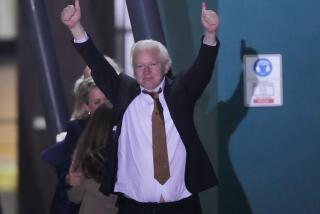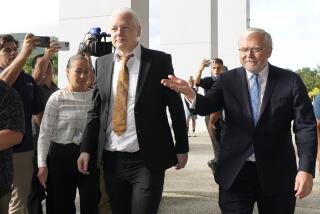Accused Spy Cuts Deal to Save His Life
- Share via
WASHINGTON — Former FBI agent Robert Philip Hanssen struck a deal Tuesday to plead guilty to charges of rampant spying for the Russians, an agreement that will spare his life and clear the way for the government to interrogate him about the most damaging espionage breach in FBI history.
The agreement, which is expected to be finalized in federal court Friday, ensures that Hanssen’s wife will receive part of his government pension to help support their six children, according to officials close to the case.
The deal also obligates Hanssen to return the estimated $1.4 million that he reaped from the Russians for his espionage work spanning more than 15 years--although it is unclear whether the government will ever see any of that money, sources said.
Hanssen, 57, will agree to spend the rest of his life in prison under terms of the deal. He had faced a possible death sentence because he allegedly helped unmask two Soviet “moles” who were executed as a result of their work for the United States in the 1980s. The Justice Department agreed last month to drop the death penalty, paving the way for this week’s deal.
Preston Burton, one of Hanssen’s attorneys, refused to discuss the terms of the deal but said it was “an appropriate resolution to this case, and we think it’s beneficial to the government and to Mr. Hanssen and his family. He cares very much about what happens to his family.”
Assistant U.S. Atty. Randy Bellows, the lead prosecutor on the case, confirmed that Hanssen is expected to plead guilty to espionage charges Friday morning in federal court in Alexandria, Va. Beyond that, however, the agreement “is under [court] seal, and I can’t comment on it,” he said.
The deal closes out the criminal phase of the Hanssen case and now opens a critical chapter, as the former counterintelligence supervisor for the FBI will agree to be interrogated at length by U.S. intelligence officials for extensive debriefings in coming months.
Officials Will Try to Fill In Some Gaps
Although authorities have already detailed a long litany of secrets that Hanssen allegedly gave the Russians, they will now be looking to fill in some of the gaps in the case, including whether Hanssen was actively spying during the 1990s, when evidence of his links to Moscow mysteriously dried up.
“Being able to debrief this guy is absolutely critical,” Skip Brandon, the former head of intelligence at the FBI, said in an interview. “There’s likely to be an awful lot we don’t know, and I wouldn’t be surprised to find that this supposed dormant period [in the 1990s] wasn’t really a dead period for him after all.”
The information that Hanssen can provide is not merely historical artifact, said Rep. Adam B. Schiff (D-Burbank), a member of the House Judiciary Committee who prosecuted the infamous spy case of FBI agent Richard W. Miller in Los Angeles a decade ago.
The debriefings, Schiff said, may provide a critical understanding of what espionage tools the Russians are using even today and of how the FBI can plug internal leaks amid unprecedented scrutiny of its security operations.
The Hanssen deal follows a familiar path of notorious spies pleading guilty and agreeing to tell everything they know in exchange for concessions from the government.
CIA spy Aldrich H. Ames, regarded along with Hanssen as one of the most damaging double-agents in U.S. history, agreed to a life term in prison in 1994 in exchange for leniency for his wife, who was a partner in his espionage. And retired Navy warrant officer John A. Walker pleaded guilty nine years earlier to charges of spying for the Soviets, largely because he wanted to spare a life sentence for his son, who was part of the family spy ring. Navy spy Michael Walker got a 25-year sentence, while his father agreed to a life term.
Hanssen Concerned About Family Finances
Because Hanssen allegedly acted alone, he did not have to worry during plea negotiations about keeping any family members out of prison, said sources who asked not to be identified because of the sensitive nature of the case. But he was deeply concerned about the financial future of his wife and his six children, who range from high school age to young adults. Under the terms of this week’s deal, his family is expected to receive what amounts to survivor’s benefits--typically about 60% of an agent’s full pension.
Although the exact dollar amount in Hanssen’s case was not immediately known, a survivor’s benefit for the family of an agent with 25 years’ experience at Hanssen’s pay grade level would generally total about $42,000 a year.
Brandon, the former FBI official, said the pension benefits may irk some people.
“I don’t wish the family any ill will, but it kind of sticks in my craw to say someone is going to have a pension for the rest of their life when he’s been a traitor to his country,” Brandon said. “But I guess it’s a small price to pay . . . for being able to find out what he knows.”
Said John Martin, the former head of the Justice Department’s counterespionage team: “In these circumstances, where there’s no sign that the wife was a witting participant in any of the espionage activity, you really have no reason to punish the family.”
When plea negotiations intensified last month, Hanssen’s lawyers sought not only to take the death penalty off the table, but also to avoid a life sentence, law enforcement sources said. But Justice Department officials, including Atty. Gen. John Ashcroft, were resolute in refusing to negotiate anything short of a life sentence, the sources said.
Hanssen is expected to plead guilty to all but about five of the 21 charges of espionage and conspiracy that were brought against him in May by a grand jury.
Hanssen, who was arrested in February near his home in suburban Washington after dropping off a package of secrets at a “dead drop” location, allegedly gave his Russian handlers more than 6,000 pages of secret material and 26 computer discs over the years on U.S. bugging operations against Russia, intelligence agents and other top-secret material.
The Russians allegedly gave Hanssen $1.4 million in cash and diamonds for his work. However, Hanssen’s imprisonment and his financial straits make it uncertain whether the government will ever be able to collect any of that money from him.
One FBI official who asked not to be identified said that as resentful as many agents are toward Hanssen, “there’s a clear sense of relief” that the government will be able to find out what Hanssen knows without having to go through a protracted and messy trial. “At least now we know this guy won’t be taking his secrets to the grave,” the official said.
The grand jury indictment alleges that Hanssen, who held a top-secret security clearance from the time he joined the FBI in 1976, began spying for the Russians in 1985. But evidence has emerged in recent weeks suggesting that he may have begun turning over secrets as early as 1979.
As authorities prepare to debrief Hanssen, they are anxious to compile an accurate timeline on his activities and match it against suspected breaches in U.S. intelligence.
More to Read
Sign up for Essential California
The most important California stories and recommendations in your inbox every morning.
You may occasionally receive promotional content from the Los Angeles Times.










